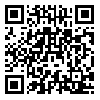Volume 11, Issue 1 (June 2025)
Elderly Health Journal 2025, 11(1): 13-21 |
Back to browse issues page
Download citation:
BibTeX | RIS | EndNote | Medlars | ProCite | Reference Manager | RefWorks
Send citation to:



BibTeX | RIS | EndNote | Medlars | ProCite | Reference Manager | RefWorks
Send citation to:
Ebrahimi Nia S, Afshani S, Ruhani A, Torkashvand Moradabadi M. Elderly's Poverty in Interaction with Social Security Systems in Iran: A Grounded Theory Study in Tehran. Elderly Health Journal 2025; 11 (1) :13-21
URL: http://ehj.ssu.ac.ir/article-1-339-en.html
URL: http://ehj.ssu.ac.ir/article-1-339-en.html
Department of Sociology, Faculty of Social Sciences, Yazd University, Yazd, Iran , afshanialireza@yazd.ac.ir
Abstract: (505 Views)
Introduction: Begging, as a deeply rooted social issue, has been experienced by human societies since ancient times. Over different historical periods, it has altered along the economic, social, and cultural conditions of its time, taking on various forms and dimensions. In recent years, with the significant increase in the elderly population in Iran, particularly in metropolitan Tehran, the phenomenon of begging among this age group has also witnessed a notable rise. Beyond its human and ethical dimensions, this issue has critical economic and social consequences that demand serious attention.
Methods: This study focuses on the economic dimensions of elderly begging in Tehran. Employing a grounded theory approach, the research aims to identify and explain the economic factors contributing to elderly begging. A theoretical and purposive sampling method was employed to collecte data from 16 elderly beggars via in-depth semi-structured interviews.
Results: The results led to 15 primary categories and one core category titled "Poverty and Distrust in Support Systems", which were thoroughly presented along with a paradigmatic model. According to the findings, economic damages resulting from blood money (diyah) and dowry payments, economic shocks caused by bereavement, lack of financial resources, deprivation of inheritance support, experiences of financial failure, and fraud have significantly weakened the economic capital of elderly beggars.
Conclusion: Economic insecurity among the elderly has led to their dependence on government and charitable support. However, due to inappropriate treatment and stringent conditions imposed by these institutions, some elderly are deprived of the aids they need. Consequently, begging has emerged as an adaptive behavior in response to unfavorable economic and social conditions.
Methods: This study focuses on the economic dimensions of elderly begging in Tehran. Employing a grounded theory approach, the research aims to identify and explain the economic factors contributing to elderly begging. A theoretical and purposive sampling method was employed to collecte data from 16 elderly beggars via in-depth semi-structured interviews.
Results: The results led to 15 primary categories and one core category titled "Poverty and Distrust in Support Systems", which were thoroughly presented along with a paradigmatic model. According to the findings, economic damages resulting from blood money (diyah) and dowry payments, economic shocks caused by bereavement, lack of financial resources, deprivation of inheritance support, experiences of financial failure, and fraud have significantly weakened the economic capital of elderly beggars.
Conclusion: Economic insecurity among the elderly has led to their dependence on government and charitable support. However, due to inappropriate treatment and stringent conditions imposed by these institutions, some elderly are deprived of the aids they need. Consequently, begging has emerged as an adaptive behavior in response to unfavorable economic and social conditions.
Type of Study: Research |
Subject:
Special
Received: 2025/01/28 | Accepted: 2025/06/21 | Published: 2025/06/20
Received: 2025/01/28 | Accepted: 2025/06/21 | Published: 2025/06/20
Send email to the article author
| Rights and permissions | |
 |
This work is licensed under a Creative Commons Attribution-NonCommercial 4.0 International License. |







